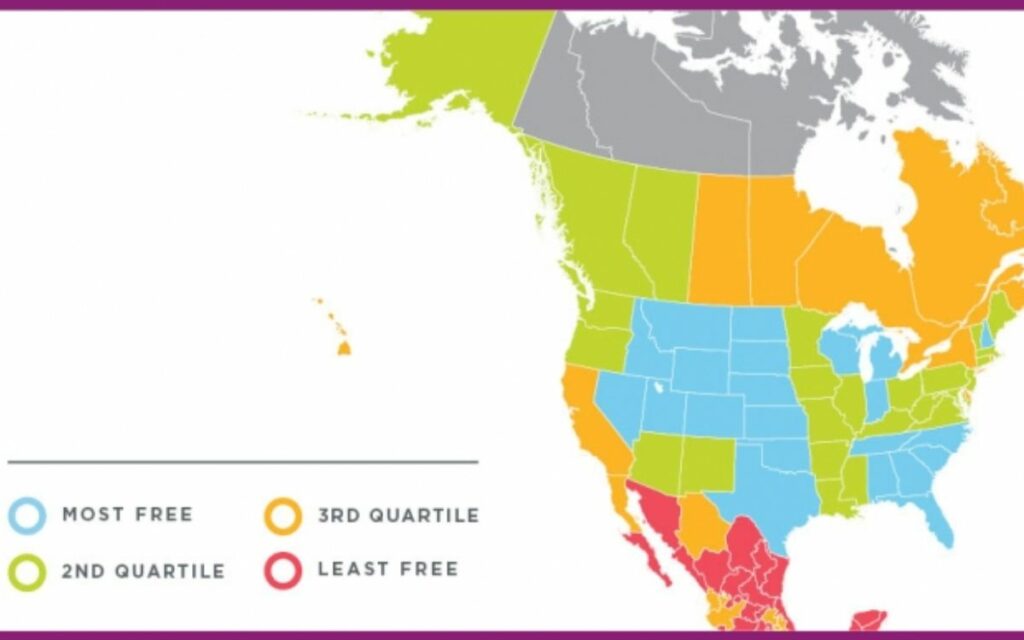
Photo Credit: Fraser Institute
It’s been hard to miss all of the negative news on the Canadian economy lately. As such, it probably won’t come as a surprise to many Canadians that this year’s survey results on Economic Freedom that were made public this week find an ongoing deterioration in virtually all Canadian provinces as compared to US and Mexican states. These are the jurisdictions most likely to be in competition with Canada for business and economic development. This survey is conducted annually and reported on by Canada’s Fraser Institute. The survey examines such issues as government spending, taxation, the regulatory burden and labour market restrictions, all of which reduce economic freedom and therefore economic growth. The full report can be found here for 2023.
This most recent analysis found that all Canadian provinces are in the bottom half of economic freedom measures for North America. The study reviewed 50 US states, 32 Mexican states, 10 Canadian provinces and Puerto Rico. Alberta was the highest-ranking Canadian province, but it still came in only tied for 31st place in the total of 93 jurisdictions included. British Columbia is ranked second among provinces in 45th place overall, with Ontario in third (50th place) and Manitoba in fourth (54th place). The four Atlantic provinces have the lowest levels of economic freedom of all Canadian provinces and US states – nothing to be proud of and indicative of their persistently weak economies. Over the years, this report has shown that all Canadian provinces have experienced significant declines in economic freedom, especially since 2014.
This study is also done world-wide on an annual basis. Both Canada and the US have usually been among the top ten countries globally in economic freedom, but Canada fell out of the top 10 in 2021 and has remained out of the top 10 since. As for the ranking of US jurisdictions in the North American research, New Hampshire was in first place followed by Florida, South Carolina, Idaho and Indiana.
Economic freedom may sound like an esoteric concept, yet it underlies the prosperity of any province or country. Other economic indicators have also identified factors that restrict Canada’s economic freedom as serious problems, such as the fact that Canada’s productivity has fallen to only about 70 per cent of that in the US. Twenty years ago, our productivity was just over 80 per cent of that in the US. This means our standard of living has declined significantly over this period compared to the US, at a time when the US is not exactly the poster child for sensible government spending and regulation as they also have serious issues with sky-high government debt and excessive regulation. The OECD (Organization for Economic Co-operation and Development) has noted that Canada’s standard of living is trailing that of the rest of the developed world, and predicts that we will rank last in real (adjusted for inflation) GDP growth per capita among all 38 OECD member countries not just for the next few years, but until 2060!
One consideration that must be included in Canada’s declining productivity in recent years is immigration. The Trudeau government has ramped up immigration to record levels and continues to project high immigration numbers for the foreseeable future. Federal Liberal immigration policy has also weakened the “points” system that was a successful basis for Canadian immigration for decades, where prospective immigrants were allotted points on the basis of them having skills that were in demand in Canada, financial means to support themselves and other positive attributes. Bringing record numbers of people into Canada who do not conform to these criteria means that our population increases without a significant boost in productivity.
The Liberals have said that a major part of their growth strategy is growing our population via immigration. And when a surge of new entrants come into Canada, there is a bump in GDP as these people find homes, buy consumers goods, become employed and pay taxes. But if immigrants are not filling labour force skill sets needed in Canada and add to our per capita productivity, we will end up having a higher population but a lower GDP per person. This is happening in Canada today.
All of the dire predictions we have seen for Canada’s future are based on current trends and policies continuing. If Canadian governments can reduce their spending, streamline the regulatory burden and reduce taxes, this dismal future does not have to come to pass. Many Canadians are directly feeling the impact of our diminished economic fortunes and it is depressing to see drastically increased numbers of Canadians relying on food banks, so many struggling small- and medium-sized businesses, businesses leaving Canada for more competitive jurisdictions and inflation continuing to drive up the cost of living. It is up to all of us to demand better from our governments, as it is their policies that are reducing our economic freedom and damaging our current and future standard of living in the process.

She has published numerous articles in journals, magazines & other media on issues such as free trade, finance, entrepreneurship & women business owners. Ms. Swift is a past President of the Empire Club of Canada, a former Director of the CD Howe Institute, the Canadian Youth Business Foundation, SOS Children’s Villages, past President of the International Small Business Congress and current Director of the Fraser Institute. She was cited in 2003 & 2012 as one of the most powerful women in Canada by the Women’s Executive Network & is a recipient of the Queen’s Silver & Gold Jubilee medals.


















